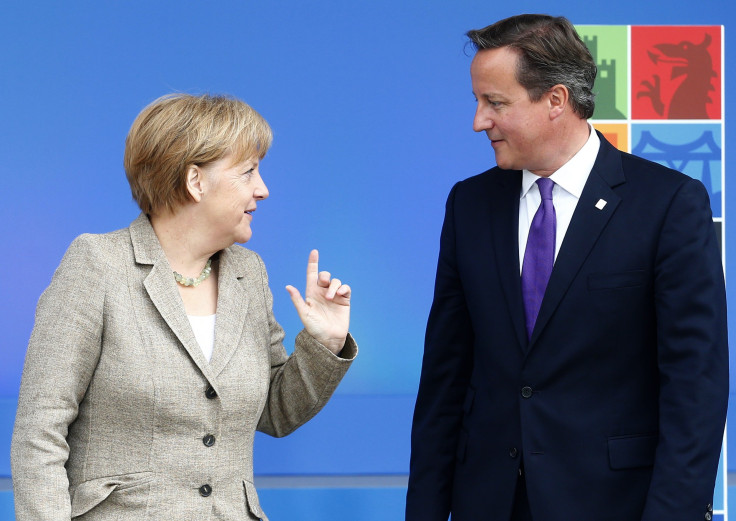UK-Germany EU Immigration Dispute Won’t Spell 'Brexit' Just Yet, Analysts Say

The U.K. and Germany’s escalating standoff over immigration controls is fueling fears of a possible British exit from the European Union. But some analysts say the dispute is largely the result of political gamesmanship by British Prime Minister David Cameron as he looks to solidify support for next year’s elections.
Cameron and German Chancellor Angela Merkel have been butting heads over Cameron’s proposals to impose immigration controls on EU citizens moving to the U.K., a prospect that Germany says violates the EU’s core principle of free movement of citizens among member states. Over the weekend, German newsmagazine Der Spiegel reported that Merkel said Cameron’s demands were pushing the U.K. toward a “point of no return,” and that Germany would give up trying to keep Britain in the European Union if Cameron continued to insist on immigration limits. British Chancellor of the Exchequer (equivalent to a finance minister) George Osborne, in turn, has said the U.K. will continue to pursue its “national interest” on immigration.
Fears of an impending “Brexit” have been mounting in recent years as U.K. citizens have grown disenchanted with membership in the union. Nikolaus Haufler, a centrist member of the parliament of the city of Hamburg, said in an email that limiting EU citizens’ movement into the U.K. would be a serious breach of EU treaties.
“Politically, [UK immigration controls on EU citizens] would leave the exit as the only option on the table: If one country started breaking the law without consequences, there would be no reason for any country to fulfill their obligations, and this could only lead to chaos,” he said.
But R. Daniel Keleman, a professor of political science at Rutgers University, said Cameron’s main motivation was to appeal to anti-immigrant sentiment within the U.K., particularly with a recent surge of support for the United Kingdom Independence Party, which advocates both for an exit from the EU and strict immigration controls. “With the rise of the UKIP and its threat to the Conservative Party, Cameron is trying to take a much tougher line on the issue of immigration,” he said.
The U.K. was hasty in lifting restrictions for EU migrant workers when Eastern European countries joined the union beginning in 2004, Keleman said, adding that Cameron’s recent push for immigration controls represented a “real about-face under pressure from the anti-immigration lobby.”
Haufler said the discussion over restricting freedom of movement seemed to be “largely a symbolic issue” within the U.K. “This issue is not easy to understand from the outside given the high number of non-EU immigrants inside the U.K., especially from Commonwealth countries,” he said.
Yet Cameron has no real desire to take Britain out of the EU, Keleman said. “He knows it would be terrible for the British economy. But also, if the U.K. left the EU, then it’s almost sure that Scotland would hold another referendum on leaving the U.K., and probably win this time.”
“The bigger endgame here is about 2015,” he added, referencing to next year's general election. “Cameron has every incentive to try to at least give the appearance that he’s reached some kind of deal [with the EU], even if he doesn’t get all he wants.”
Since the Spiegel report emerged Sunday, other reports have indicated that Cameron may be backing off his push for EU migrant quotas. The Sunday Times of London quoted one Cabinet minister as saying that Cameron would try “stretch the existing rules to their limits” rather than overhaul EU migration rules. Cameron is expected to unveil new proposals later this month or in early December. Keleman also said the EU would most likely come to an agreement to impose more restrictions on EU migrants’ eligibility for public benefits, rather than a cap on migrant numbers.
The 2015 elections could lead to the ultimate test for Britain's future with the European Union. Cameron has promised that a win for his Conservative Party would result in a referendum vote in 2017 on membership in the EU.
Haufler said that anti-EU sentiment and the severity of this immigration dispute was in part the result of the EU’s own failures. “There were too many cases where the EU's image as bureaucratic, inefficient and remote was confirmed by bad and myopic decision-making -- and anti-EU parties happily pointed out every single one of them to the voters,” he said.
© Copyright IBTimes 2024. All rights reserved.






















